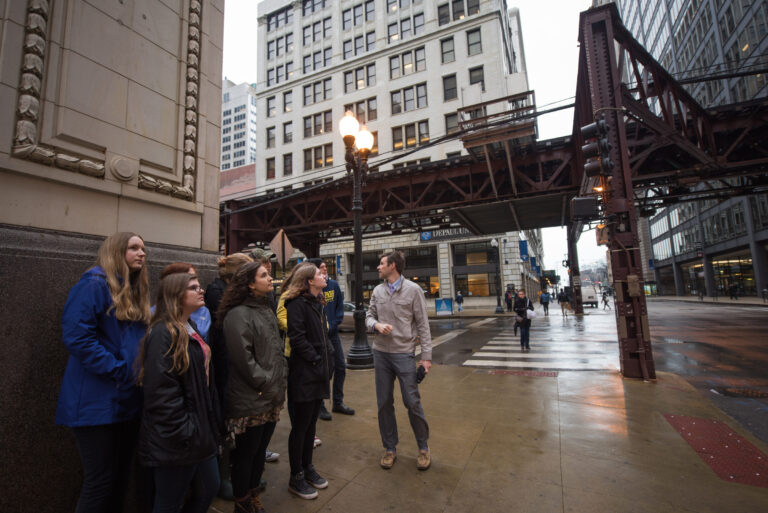CHICAGO (January 6, 2017) — On Thursday, January 19, President David L. Parkyn, along with Dominican University President Donna Carroll, will speak at an event . The day’s topic is the national challenge of growing tomorrow’s workforce, as well as the state-wide challenge of keeping Illinois’ graduates here post-degree. The panelists will explore how a liberal arts education prepares students with the in-demand skills that keep businesses competitive—and the programs they implemented to help students build ties with the community.
Building an Engaged, Employable Citizenry through Experiential Curriculum
For Parkyn, “connecting college students to the world that surrounds them is key to building an engaged citizenry.” ���ϳԹ� recognizes a close link between students engaging in hands-on experiential learning opportunities and building a connection to their surroundings. The University has established meaningful learning opportunities outside the classroom that help students become active citizens, who contribute to Illinois’ workforce by landing jobs in the state.
North Park’s experiential learning curriculum—offered through programs including Engage Chicago, the Chicago Intensive, and CRUX—prepares students to work in diverse environments. These hands-on experiences teach students how to be agile in diverse settings—skills transferable to the workforce. Situated in an urban setting, North Park embraces the city of Chicago as part of its curriculum. Students enjoy direct experience working with partner organizations, including nonprofits and civic organizations. “Having the chance to be part of the inner-workings of an organization prepares undergraduates with an understanding of what it means to make a contribution as they enter the workforce,” says Dr. Parkyn.
Value in the Liberal Arts
By way of example, professional services like accounting and tax firms are increasingly changing their business models. Many manual tasks have been eliminated by technology and automation. However, these businesses still need to stay connected with their clients to understand their needs and build trust. The client-service relationship requires strong interpersonal communication abilities. An education in the liberal arts, among other foundational skills acquired, provides a well-developed repertoire of soft skills transferable to in-demand jobs.
Soft skills cultivated from a liberal arts education are used in business settings to understand client needs and respond to them strategically, creatively, and with thoughtful communication. Gregor Thuswaldner, Dean of the College of Arts and Sciences at ���ϳԹ�, points out, “A history major, for instance, learns to digest disparate information, analyze outcomes, and form an analysis to build a case for consideration; an art major must be original in his or her creativity, thinking about how the audience will receive the art form and how to connect with their audience.”
“A liberal arts education is one that stretches the mind to use creativity and critical thinking to solve complex problems,” says Dr. Parkyn. ���ϳԹ� designs its liberal arts academic programming so that graduates are well-prepared to make a noticeable contribution to the workforce as engaged citizens with transferable, in-demand skills.
Learn more about ���ϳԹ�’s academic programs.
Watch the Address
from on .


